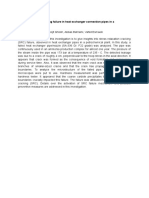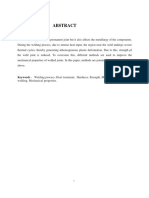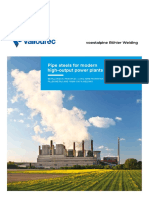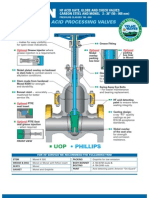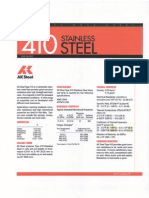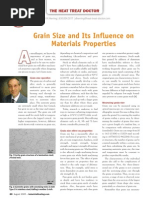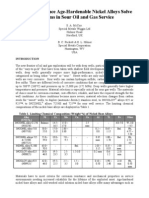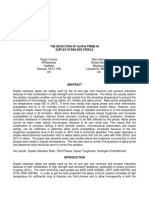Nimonic Alloy 80A
Nimonic Alloy 80A
Uploaded by
dharmatejakademCopyright:
Available Formats
Nimonic Alloy 80A
Nimonic Alloy 80A
Uploaded by
dharmatejakademCopyright
Available Formats
Share this document
Did you find this document useful?
Is this content inappropriate?
Copyright:
Available Formats
Nimonic Alloy 80A
Nimonic Alloy 80A
Uploaded by
dharmatejakademCopyright:
Available Formats
www.specialmetals.
com
Some physical properties for NIMONIC alloy 80A are
given in Table 2. The density was determined on
extruded bar, subsequently forged, and extruded
section, subsequently cold rolled, given a heat treatment
of 8 hours/1080C (1976F)/air cool + 16 hours/700C
(1292F)/air cool.
The liquidus temperature was determined by
inverse cooling techniques, and the solidus by
metallographic examination. The accuracy of
determination was 5C (9F) for the liquidus
temperature and +0, 10C (18F) for the solidus.
The magnetic property results were obtained from
4 casts of cold rolled sheet, heat treated 2-3
minutes/1150C (2102F)/fluidized bed quenched + 20
minutes/1040C (1904F)/air cooled + 4 hours/750C
(1382F)/air cooled.
The specific heat data in Table 3 are calculated
values, using the L.R. Jackson equation.
The thermal conductivity data (Table 4) were
calculated from electrical resistance measurements on 4
fully heat treated specimens using the modified
Wiedermann-Franz equation obtained by R.W. Powell.
The material was cold rolled sheet, heat treated 2-3
minutes/1150C (2102F)/fluidized bed quenched + 1
hour/925C (1697F)/air cooled + 4 hours/750C
(1382F)/air cooled.
Linear thermal expansion data (Table 5) were
obtained from 5 casts of as-extruded section,
subsequently cold rolled.
The electrical resistivity data in Table 6 were
obtained from 4 casts of cold rolled sheet, heat treated
2-3 minutes/1150C (2102F)/fluidized bed quenched +
1 hour/925C (1697F)/air cooled + 4 hours/750C
(1382F)/air cooled.
Carbon ........................................................................0.10 max.
Chromium....................................................................18.0-21.0
Silicon ............................................................................1.0 max
Copper..........................................................................0.2 max.
Iron................................................................................3.0 max.
Manganese ...................................................................1.0 max.
Titanium...........................................................................1.8-2.7
Aluminum ........................................................................1.0-1.8
Cobalt ...........................................................................2.0 max.
Boron ........................................................................0.008 max.
Zirconium....................................................................0.15 max.
Lead........................................................................0.0025 max.
Sulfur ........................................................................0.015 max.
Nickel............................................................................Balance*
*Reference to the balance of a composition does not guarantee this
is exclusively of the element mentioned but that it predominates and
others are present only in minimal quantities.
Table 2 - Physical Properties
Density, g/cm3....................................................................8.19
lb/in3 ...................................................................0.296
Melting Range, C .....................................................1320-1365
F .....................................................2410-2490
Magnetic Properties
Mass Susceptibility ............................5.85 x 10-6 at 1000 gauss
Volume Susceptibility .........................4.78 x 10-5 at 1000 gauss
Magnetic Permeability..............1.000601 for 200-2000 oersted
Table 3 - Specific Heat
C
J/kg C
Btu/lb F
20
100
200
300
400
500
600
700
800
900
1000
68
212
392
572
752
932
1112
1292
1472
1652
1832
448
469
494
519
548
573
599
628
653
678
703
0.107
0.112
0.118
0.124
0.131
0.137
0.143
0.150
0.156
0.162
0.168
NIMONIC alloy 80A
Physical Properties
Table 1 - Limiting Chemical Composition, % by Weight
NIMONIC alloy 80A (UNS N07080/W. Nr. 2.4952 &
2.4631) is a wrought, age-hardenable nickel-chromium
alloy, strengthened by additions of titanium, aluminum
and carbon, developed for service at temperatures up to
815C (1500F). It is produced by high-frequency
melting and casting in air for forms to be extruded.
Electroslag refined material is used for forms to be
forged. Vacuum refined versions are also available.
NIMONIC alloy 80A is currently used for gas turbine
components (blades, rings and discs), bolts, nuclear
boiler tube supports, die casting inserts and cores, and
for automobile exhaust valves.
The alloys limiting chemical composition is given
in Table 1 (as in British Standard HR1, 201, 401 and
601).
NIMONIC alloy 80A
Physical Properties (continued)
Table 6 - Electrical Resistivity
Table 4 - Thermal Conductivity
C
20
100
200
300
400
500
600
700
800
900
1000
W/m C
68
212
392
572
752
932
1112
1292
1472
1652
1832
124 cm (746 /circ mil ft) at 20C (68F)
Btu/fthF
11.2
11.6
14.4
16.1
17.8
19.4
20.8
22.3
24.5
26.5
28.4
6.47
6.71
8.32
9.31
10.3
11.2
12.0
12.9
14.2
15.3
16.4
Relative Resistance
20
100
200
300
400
500
600
700
800
900
1000
68
212
392
572
752
932
1112
1292
1472
1652
1832
1.000
1.008
1.023
1.040
1.064
1.073
1.064
1.064
1.057
1.032
1.017
Table 5 - Mean Coefficient of Linear Thermal Expansion
C
20 100
200
300
400
500
600
700
800
900
1000
10-6/C
A
12.7
13.3
13.7
14.1
14.4
15.0
15.5
16.2
17.1
18.1
12.8
13.3
13.7
14.1
14.5
15.0
15.5
16.2
17.1
18.2
F
68 212
392
572
752
932
1112
1292
1472
1652
1832
A Heat treated 8 hours/1080C (1976F)/air cooled +
16 hours/700C (1292F)/air cooled.
B Heat treated 8 hours/1080C (1976F)/air cooled +
24 hours/850C (1562F)/air cooled+
16 hours/700C (1292F)/air cooled.
10-6/F
A
7.1
7.4
7.6
7.8
8.0
8.3
8.6
9.0
9.5
10.1
7.1
7.4
7.6
7.8
8.1
8.3
8.6
9.0
9.5
10.1
Table 7 - Torsional Modulus
C
20
100
200
300
400
500
600
700
800
900
1000
68
212
392
572
752
932
1112
1292
1472
1652
1832
GPa
103 ksi
85
84
82
79
77
74
70
67
64
58
53
12.3
12.2
11.9
11.5
11.2
10.7
10.2
9.7
9.3
8.4
7.7
Cold rolled sheet (4 casts). Heat treated 2-3 minutes/1150C (2102F)/
fluidized bed quenched + 20 minutes/ 1040C (1904F)/air cooled +
4 hours/750C (1382F)/air cooled.
NIMONIC alloy 80A
Table 8 - Dynamic Youngs Modulus
Test Program
A
GPa (10 3 ksi)
GPa (10 3 ksi)
GPa (10 3 ksi)
GPa (10 3 ksi)
Property
20 (68)
100 (212)
200 (392)
300 (572)
400 (752)
500 (932)
600 (1112)
700 (1292)
800 (1472)
900 (1652)
1000 (1832)
A.
183
179
173
168
163
157
150
142
134
123
112
(26.5)
(30.0)
(25.1)
(24.4)
(23.6)
(22.8)
(21.8)
(20.6)
(19.4)
(17.8)
(16.2)
219
216
210
204
197
191
183
175
165
153
141
(31.8)
(31.3)
(30.5)
(29.6)
(28.6)
(27.7)
(26.5)
(25.4)
(23.9)
(22.2)
(20.5)
214
210
205
199
192
185
178
170
161
149
134
(31.0)
(30.5)
(29.7)
(28.9)
(27.8)
(26.8)
(25.8)
(24.7)
(23.3)
(21.6)
(19.4)
222
219
213
208
201
194
188
180
170
159
145
(32.2)
(31.8)
(30.9)
(30.2)
(29.2)
(28.1)
(27.3)
(26.1)
(24.7)
(23.1)
(21.0)
Extruded bar (12 casts). Heat treated 8 hours/1080C (1976F)/air cooled + 16 hours/700C (1292F)/air cooled.
B.
Extruded bar, subsequently forged (13 casts). Heat treated 8 hours/1080C (1796F)/air cooled + 16 hours/700C (1292F)/air cooled.
C.
Extruded section, subsequently cold rolled (5 casts). Heat treated 8 hours/1080C (1796F)/air cooled + 16 hours/700C (1292F)/air cooled.
D.
Cold rolled sheet (4 casts). Heat treated 2-3 minutes/1150C (2102F)/fluidized bed quenched + 20 minutes/1040C (1904F)/air cooled + 4 hours/750C
(1382F)/air cooled. Dynamic moduli are usually about 0.2% higher than static moduli at room temperature, increasing to 1% at 1000C (1832F).
Mechanical Properties
The tensile data quoted in Figures 1 to 11 are for bar, section
and sheet after the recommended treatments. Statistical data
on the scatter of results from tests on production material are
shown in Figures 1 to 6.
Strain rate 0.005/min to proof stress at room temperature,
0.002/min to proof stress at elevated temperatures, and
0.1/min therafter.
Note: in Figures 1 to 11
A
= Elongation
Rm
= Tensile Strength
Rp0.2 = 0.2% Proof Stress
Z
= Reduction of Area
NIMONIC alloy 80A
F
200
400
600
800
1000
1200
1400
1600
1800
80
1600
220
200
180
60
1200
120
100
40
800
Z%
140
Stress, MPa
Stress, ksi
160
80
60
Rp 0.2
400
20
40
20
0
200
400
600
800
1000
C
Figure 1. Tensile properties of extruded bar. Heat treated 8 hours/1080C
(1976F)/air cooled + 16 hours/700C (1292F)/air cooled. 98%
confidence region calculated on 13 casts.
200
400
600
800
F
1000
1200
1400
1600
1800
1600
80
220
200
1200
60
Rm
140
120
100
Stress, MPa
Stress, ksi
160
40
800
80
60
400
20
40
20
0
200
400
600
800
1000
C
Figure 2. Tensile properties of extruded bar. Heat treated 8 hours/1080C
(1976F)/air cooled + 16 hours/700C (1292F)/air cooled. 98%
confidence region calculated on 13 casts.
A%
180
NIMONIC alloy 80A
F
200
400
600
800
1000
1200
1400
1600
1800
80
1600
220
200
180
1200
60
120
100
40
800
80
Z%
140
Stress, MPa
Stress, ksi
160
Rp 0.2
60
20
400
40
20
0
200
400
600
0
1000
800
C
Figure 3. Tensile properties of extruded bar, subsequently forged. Heat
treated 8 hours/1080C (1976F)/air cooled + 16 hours/700C (1292F)/air
cooled. 98% confidence region calculated on 15 casts.
F
200
400
600
800
1000
1200
1400
1600
1800
80
1600
220
200
Rm
180
60
1200
120
100
800
40
400
20
A%
140
Stress, MPa
Stress, ksi
160
80
60
40
20
0
0
0
200
400
600
800
1000
C
Figure 4. Tensile properties of extruded bar, subsequently forged. Heat
treated 8 hours/1080C (1976F)/air cooled + 16 hours/700C (1292F)/air
cooled. 98% confidence region calculated on 15 casts.
NIMONIC alloy 80A
200
400
600
800
F
1000
1200
1400
1600
1800
1600
80
1200
60
220
200
180
120
100
Z
40
800
Z%
140
Stress, MPa
Stress, ksi
160
80
Rp 0.2
60
20
400
40
20
0
0
0
200
400
600
800
1000
C
Figure 5. Tensile properties of extruded bar, subsequently forged. Heat
treated 8 hours/1080C (1976F)/air cooled + 24 hours/850C (1562F)/air
cooled + 16 hours/700C (1292F)/air cooled. 98% confidence region
calculated on 11 casts.
F
200
400
600
800
1000
1200
1400
1600
1800
80
1600
220
200
140
120
60
40
800
100
A
80
60
20
400
40
20
0
200
400
600
800
1000
C
Figure 6. Tensile properties of extruded bar, subsequently forged. Heat
treated 8 hours/1080C (1976F)/air cooled + 24 hours/850C (1562F)/air
cooled + 16 hours/700C (1292F)/air cooled.
A%
Stress, ksi
160
Rm
1200
Stress, MPa
180
NIMONIC alloy 80A
F
200
400
600
800
1000
1200
1400
1600
1800
80
1600
220
200
180
1200
60
Rm
120
100
Z
40
800
Rp 0.2
A, Z %
140
Stress, MPa
Stress, ksi
160
A
80
60
20
400
40
20
0
200
400
600
0
1000
800
C
Figure 7. Tensile properties of extruded section, subsequently cold rolled.
Heat treated 8 hours/1080C (1976F)/air cooled + 16 hours/700C
(1292F)/air cooled.
200
400
600
800
F
1000
1200
1400
1600
1800
80
1600
220
200
180
1200
60
Rm
120
100
Z
40
800
Rp 0.2
80
60
A, Z%
140
Stress, MPa
Stress, ksi
160
A
20
400
40
20
0
200
400
600
800
0
1000
C
Figure 8. Tensile properties of extruded bar, subsequently cold rolled.
Heat treated 8 hours/1080C (1976F)/air cooled + 24 hours/850C
(1562F)/air cooled + 16 hours/700C (1292F)/air cooled. Average results
of tests calculated on 5 casts.
NIMONIC alloy 80A
F
200
400
600
800
1000
1200
1400
1600
1800
1600
80
1200
60
220
200
Rm
140
120
100
Stress, MPa
Stress, ksi
160
Z
40
800
Rp 0.2
80
60
A, Z %
180
A
20
400
40
20
0
200
400
600
0
1000
800
C
Figure 9 . Tensile properties of extruded bar, subsequently cold stretched.
Heat treated 8 hours/1080C (1976F)/air cooled + 24 hours/850C
(1562F)/air cooled + 16 hours/700C (1292F)/air cooled. Results from 1
cast.
200
400
600
800
F
1000
1200
1400
1600
1800
1600
80
1200
60
220
200
180
120
100
Rm
40
800
Rp 0.2
80
60
A
20
400
40
20
0
0
0
200
400
600
800
1000
C
Figure 10. Tensile properties of colled rolled sheet. Heat treated 2 to 3
minutes/1150C (2102F)/fluidized bed quenched + 20 minutes/1040C
(1904F)/air cooled + 4 hours/750C (1382F)/air cooled. Average results of
tests on 5 casts.
A%
140
Stress, MPa
Stress, ksi
160
NIMONIC alloy 80A
F
200
400
600
800
1000
1200
1400
1600
1800
1600
80
1200
60
220
200
140
120
100
Rm
Stress, MPa
Stress, ksi
160
40
800
Rp 0.2
A%
180
80
A
60
20
400
40
20
0
200
400
600
800
0
1000
C
Figure 11 . Tensile properties of cold rolled sheet, welded. Heat treated
2 minutes/1150C (2102F)/air cooled + weld + 1 hour/925C (1697F)/air
cooled + 4 hours/750C (1382F)/air cooled. Average result of tests on 4
casts. Sheet thicknesses, 0.7-1.1 mm (0.03-0.04 inch). T.I.G. welded.
Creep Properties
The creep resistance properties of NIMONIC alloy 80A
have been determined on bar (16-18 casts), section (5 casts),
and sheet (1 cast). Total plastic strain data have been
determined on extruded section and sheet (1 cast).
Creep properties for extruded bar, subsequently forged,
are shown in Figures 12 and 13; for extruded bar,
subsequently cold rolled, in Figure 14; and for cold rolled
sheet in Figures 13 and 15 by Larson-Miller presentations
and Graham and Walles techniques.
The Graham and Walles technique assumes that stresstime test points fall on the continuous series of straight lines
for each temperature, with slopes 1/32, 1/16, 1/8, 1/4, 1/2,
the change of slope and the distance between the lines being
dependent on a time/temperature relationship.
Derived total plastic strain data for extruded section,
subsequently cold rolled, and for cold rolled sheet, are
shown in Tables 9 and 10. Specimens were 9.1-11.7 mm
(0.36-0.46 inch) diameter x 76 mm (3.0 inch) gauge length.
NIMONIC alloy 80A
Figure 12 . Creep properties of NIMONIC alloy 80A extruded bar, subsequently forged. Heat treatment 8 hours/1080C
(1976F)/air cooled + 16 hours/700C (1292F)/air cooled. 98% confidence region on 16-18 casts.
140
1000
540C (1004F)
900
130
120
800
600C (1112F)
110
700
100
90
600
80
700C (1292F)
500
70
65
60
400
55
750C (1382F)
50
45
300
40
35
815C (1499F)
30
200
28
26
22
20
MPa
ksi
24
18
16
14
100
90
12
10
9
80
70
60
8
7
6
50
40
5
30
4
20
10
100
1000
Time, hours
10
10,000
100,000
NIMONIC alloy 80A
Figure 13. Creep rupture properties of NIMONIC alloy 80A bar and sheet.
Larson-Miller Parameter, T (20 + log t) x 10-3; T in K, t in hours
15
20
25
30
35
100
90
80
70
ksi
10
10 MPa
150
50
100
90
80
70
40
60
60
50
30
40
25
20
30
25
100
200
20
15
20
10
9
8
7
6
15
5
4
300
100
5
3
400
500
800
200
600
700
10
9
8
7
6
1.5
300
400
2
1.5
900
1000
500
1100
1200
600
1300
1400
700
1500
1600
1700
800
900
1800
1900
1000
2000
2100
1100
2200
2300
1200
10-1
100
101
102 103
104
105
Hours
Extruded bar, subsequently forged. Heat treated 8 hours/1080C (1976F)/air cooled + 16 hours/700C (1292F)/air cooled.
Average results from 16-18 casts.
Cold rolled sheet. Heat treated 2 minutes/1150C (2102F)/air cooled + 4 hours 750C (1382F)/air cooled. Results from 1 cast.
Sheet 1.6mm (0.06 inch) thick.
11
NIMONIC alloy 80A
Figure 14 . Creep properties of NIMONIC alloy 80A extruded section, subsequently cold rolled. Average results from 5 casts.
140
1000
900
130
120
800
110
100
700
90
600
80
540C
(1004F)
600C
(1112F)
700C
(1292F)
500
70
65
60
400
750C
(1382F)
55
50
45
300
40
815C
(1499F)
35
30
200
28
26
ksi
22
20
MPa
24
18
16
14
100
90
12
10
9
80
70
60
8
7
6
50
40
5
30
4
20
10
100
1000
10,000
100,000
Time, hours
12
notched
Heat treated 8 hours/1080C (1976F)/air cooled + 16 hours/700C (1292F)/air cooled.
notched
Heat treated 8 hours/1080C (1976F)/air cooled + 24 hours/850C (1562F)/air cooled + 16 hours/700C (1292F)/air cooled.
NIMONIC alloy 80A
Figure 15 . Creep-rupture properties of NIMONIC alloy 80A cold rolled sheet, 1.6 mm (0.06 inch) thick. Results from 1 cast.
140
1000
900
130
120
800
110
700
100
90
600
80
500
70
65
60
400
55
50
45
300
40
35
30
200
28
26
650C (1202F)
22
20
MPa
ksi
24
700C (1292F)
18
16
14
100
750C (1382F)
90
12
10
9
80
70
800C (1472F)
60
8
7
6
50
40
850C (1562F)
30
20
10
100
1000
10,000
100,000
Time, hours
Heat treated 2 min/1150C (2102F)/air cooled + 4 hours/750C (1382F)/air cooled.
13
NIMONIC alloy 80A
Table 9 - Total Plastic Strain (Extruded Section, Subsequently Cold Rolled)
Heat treatment 8 hours/1080C (1976F)/air cooled + 16 hours/700C (1292F)/air cooled
C (F)
600 (1112)
650 (1202)
700 (1292)
750 (1382)
815 (1499)
Strain
%
0.1
0.2
0.5
0.1
0.2
0.5
0.1
0.2
0.5
0.1
0.2
0.5
0.1
0.2
0.5
Stress, MPa (ksi), to give total plastic strain in:
100h
558
599
635
454
502
346
388
239
273
300
124
137
148
(80.9)
(86.9)
(92.1)
(65.8)
(72.8)
(50.2)
(56.3)
(34.7)
(39.6)
(43.5)
(18.0)
(19.9)
(21.5)
300h
1000h
511 (74.1)
551 (79.9)
607 (88.0)
403 (58.4)
451 (65.4)
494 (71.6)
295 (42.8)
337 (48.9)
369 (53.5)
192 (27.8)
227 (32.9)
255 (37.0)
93 (13.5)
107 (15.5)
116 (16.8)
460 (66.7)
500 (72.5)
574 (83.2)
347 (50.3)
395 (57.3)
443 (64.2)
238 (34.5)
281 (40.7)
309 (44.8)
144 (20.9)
176 (25.5)
205 (29.7)
59 (8.6)
73 (10.6)
80 (11.6)
3000h
412
453
522
298
344
385
190
232
255
108
131
159
36
43
53
(59.7)
(65.7)
(75.7)
(43.2)
(49.9)
(55.8)
(27.6)
(33.6)
(37.0)
(15.7)
(19.0)
(23.1)
(5.2)
(6.2)
(7.7)
10,000h
30,000h
371 (53.8)
400 (58.0)
460 (66.7)
289 (41.9)
476 (69.0)
147 (21.3)
178 (25.8)
195 (28.3)
74 (10.7)*
88 (12.8)
116 (16.8)
23 (3.3)
26 (3.8)
31 (4.5)
402 (58.3)*
266 (38.6)
124 (18.0)*
141 (20.5)*
77 (11.2)*
15 (2.2)*
19 (2.8)
*Extrapolated
Table 10 - Total Plastic Strain (Cold Rolled Sheet)
Heat treatment 2 min/1150C (2102F)/water quenched + 4 hours/750C (1382F)/air cooled
C (F)
650 (1202)
700 (1292)
750 (1382)
800 (1472)
850 (1562)
14
Stress, MPa (ksi), to give total plastic strain in:
Strain
%
50h
100h
300h
1000h
0.1
0.2
0.1
0.2
0.1
0.2
0.1
0.2
0.1
0.2
422 (61.2)
479 (69.5)
275 (39.9)
332 (48.1)
165 (23.9)
205 (29.7)
102 (14.8)
130 (18.9)
73 (10.6)
93 (13.5)
377 (54.7)
432 (62.6)
235 (34.1)
289 (41.9)
137 (19.9)
175 (25.4)
85 (12.3)
108 (15.7)
59 (8.6)
74 (10.7)
307 (44.5)
366 (53.1)
176 (25.5)
225 (32.6)
102 (14.8)
131 (19.0)
62 (9.0)
77 (11.2)
39 (5.7)
51 (7.4)
224 (32.5)
286 (41.5)
125 (18.1)
161 (23.3)
71 (10.3)
91 (13.2)
42 (6.1)
53 (7.7)
23 (3.3)
31 (4.5)
NIMONIC alloy 80A
Fatigue Properties
1000
(145)
6
100 h. 60 x 10 Cycles
6
1000 h. 600 x 10 Cycles
2P
P
800
(116)
0P
600
(87)
Semi-range of alternating stress, MPa (ksi)
Figures 16 to 22 illustrate the fatigue properties of extruded
bar, subsequently cold rolled, heat treated 8 hours/1080C
(1976F)/air cooled + 16 hours/700C (1292F)/air cooled,
under conditions of uniaxial stressing with varying mean
stress.
The abscissae represent the mean stress, and the
ordinate fluctuating stress. Thus, a point on the horizontal
axis represents the steady stress which will produce fracture
in a specific time in a normal creep rupture test. A point on
the vertical axis indicates the fluctuating stress required to
produce a pure fatigue failure in the same time at the
particular stress frequency adopted.
The lines radiating from the origin correspond to stress
conditions of the form P CP, where P is the steady stress
and C is a constant for any lines of 100 and 1000 hours up
to 600C (1112F), and 100, 300 and 1000 hours up to
750C (1382F) for varying stress conditions.
Test frequencies of 100-200 cycles/second were used
up to 600C (1112F), thereafter 30-40 cycles/second up to
750C (1382F).
400
(58)
P
200
(29)
P
P
PO
200
(29)
400
600
800
(58)
(87)
(116)
Mean tensile stress, MPa (ksi)
1000
(145)
Figure 16. Fatigue test at 20C (68F)
1000
(145)
1000
(145)
100 h. 60 x 10 Cycles
6
1000 h. 600 x 10 Cycles
200
(29)
200
(29)
400
600
800
(58)
(87)
(116)
Mean tensile stress, MPa (ksi)
Figure 17. Fatigue test at 300C (572F)
2P
400
(58)
P
P
P
200
(29)
PO
PO
600
(87)
400
(58)
600
(87)
800
(116)
0P
1000 h. 600 x 10 Cycles
2P
800
(116)
Semi-range of alternating stress, MPa (ksi)
0P
Semi-range of alternating stress, MPa (ksi)
100 h. 60 x 10 Cycles
0
1000
(145)
200
(29)
400
600
800
(58)
(87)
(116)
Mean tensile stress, MPa (ksi)
1000
(145)
Figure 18. Fatigue test at 480C (896F)
15
NIMONIC alloy 80A
500
(72.5)
1000
(145)
100 h. 12 x 10 Cycles
400
(58)
P
P
200
(29)
1000 h. 120 x 10 Cycles
300
(43.5)
600
(87)
300 h. 36 x 10 Cycles
400
(58)
0P
Semi-range of alternating stress, MPa (ksi)
800
(116)
0P
Semi-range of alternating stress, MPa (ksi)
100 h. 60 x 10 Cycles
6
1000 h. 600 x 10 Cycles
200
(29)
200
(29)
400
600
800
(58)
(87)
(116)
Mean tensile stress, MPa (ksi)
/P
3 8
P
P
100
(14.5)
PO
PO
1000
(145)
Figure 19. Fatigue test at 600C (1112F)
100
200
300
400
(14.5)
(29)
(43.5)
(58)
Mean tensile stress, MPa (ksi)
500
(72.5)
Figure 20. Fatigue test at 700C (1292F)
500
(72.5)
500
(72.5)
200
(29)
100
(14.5)
/P
3 8
P
P
2P
400
(58)
200
(29)
300
(43.5)
P
P
300
(43.5)
1000 h. 120 x 10 Cycles
400
(58)
0P
Semi-range of alternating stress, MPa (ksi)
300 h. 36 x 10 Cycles
0P
Semi-range of alternating stress, MPa (ksi)
100 h. 12 x 10 Cycles
(a)
(b)
(c)
100
(14.5)
P
P
PO
100
200
300
400
(14.5)
(29)
(43.5)
(58)
Mean tensile stress, MPa (ksi)
Figure 21. Fatigue test at 750C (1382F)
PO
500
(72.5)
100
(14.5)
200
300
400
(29)
(43.5)
(58)
Mean tensile stress, MPa (ksi)
500
(72.5)
Figure 22. Fatigue test at 480C (896F)
(a) Heat treated 8h/1080C (1976F)/air cooled + 16h/700C
(1292F)/air cooled. 100 hours (60 x 106 cycles), KT + 1.0.
(b) Notched and heat treated 8h/1080C (1976F)/air cooled.
100 hours (60 x 106 cycles), KT + 4.0.
(c) Notched and heat treated 16/700C (1292F)/air cooled.
100 hours (60 x 106 cycles), KT + 4.0.
16
NIMONIC alloy 80A
Stress Relaxation Properties
The stress relaxation data in Figure 23 are for hot-rolled bar,
subsequently cold stretched, given the two recommended heat
treatments. Data derived from the three-stage heat treatment
should be regarded as tentative because only a limited amount of
testing has been completed. However, a relative improvement in
stress relaxation properties can be seen.
Figure 24 gives the relationship between the number of retightenings and re-tightening time. Tests were carried out at an
allowable plastic strain of 0.4%, although NIMONIC alloy 80A,
given the three-stage heat treatment, is capable of 1.0% total
plastic strain without serious deterioration in stress relaxation
characteristics.
Figure 25 gives the relationship between initial strain,
residual stress and time. The residual stress after a given time
was greater at the higher level of initial strain, but at a decreasing
advantage with time and temperature. This must be weighed
against future reloading because high initial stresses result in
faster conversion from elastic to plastic deformation, thus
exhausting more rapidly the available ductility and reducing the
number of times that a bolt can be reloaded.
80 M
Pa
(11.
100
6 ks
MP
i)
a (1
120
4.5
ksi)
MPa
(17.
140
4 ks
MPa
i)
(20.
3 ks
160
i
M
)
Pa (
180
23.2
MPa
ksi)
(26.1
ksi)
200
MPa
(29.0
220
ksi)
MPa
(31.9
ksi)
Temperature, C (F)
800
(1472)
700
(1292)
240
MPa
(34.8
ksi)
260
MPa
(37.7
ksi)
600
(1112)
500
(932)
10
100
1000
10,000
Hours
Figure 23. Stress relaxation properties of NIMONIC alloy 80A.
Hot rolled bar, heat treated 8h/1080C (1976F)/air cooled + 16h/700C (1292F)/air cooled.
Extruded bar, cold stretched, heat treated 8h/1080C (1976F)/air cooled + 24/850C (1562F)/air cooled +
16h/700C (1292F)/air cooled.
Initial strain, 0.15%.
17
NIMONIC alloy 80A
Stress Relaxation Properties (continued)
Number of re-tightenings before decrease in relaxation
resistance (0.4% total strain)
100
600C
(1112F)
650C
(1202F)
575C
(1067F)
550C
(1022F)
62
5C
(11
57
F)
10
575C (1067F)
600C (1112F)
625C (1157F)
650C (1202F)
100
1000
10,000
Hours
Figure 24. Relationship between re-tightenings and re-tightening time.
Hot rolled bar, heat treated 8h/1080C (1976F)/air cooled + 16h/700C (1292F)/air cooled.
Extruded bar, cold stretched, heat treated 8h/1080C (1976F)/air cooled + 24h/850C
(1562F)/air cooled + 16h/700C (1292F)/air cooled.
Initial and re-tightening strain, 0.15%.
Total strain, 0.4%.
18
NIMONIC alloy 80A
800
(1472)
Temperature, C (F)
Initial Strain 0.3%
Initial Strain 0.15%
700
(1292)
3000 h
3000 h
10,000 h
600
(1112)
10,000 h
500
(932)
350
(50.8)
300
(43.5)
30,000 h
250
(36.3)
200
(29.0)
150
(21.8)
100
(14.5)
50
(7.3)
Residual stress, MPa (ksi)
Figure 25. Relationship between initial strain, residual stress and time. (NIMONIC alloy 80A,
heat treated 8h/1080C (1976F)/air cooled + 16h/700C (1292F)/air cooled).
Corrosion Resistance
The corrosion resistance of NIMONIC alloy 80A is
presented in Table 11, and Figures 26 and 27.
Table 11 - Oxidation Resistance of NIMONIC alloy 80A.
Continuous Heating in Air.
Temperature
Descaled Weight Loss (mg/cm2) in:
30h
100h
300h
1000h
750
900
1000
1100
1200
1382
1652
1832
2012
2192
1.8
3.9
7.1
8.0
9.1
1.9
3.8
7.4
12.9
1.5
2.5
4.2
10.5
18.8
20.0
5.3
6.6
16.0
21.2
64.5
19
NIMONIC alloy 80A
Corrosion Resistance
1200C (2192F)
Weight loss, mg/cm2
30
1100C
(2012F)
20
1000C
(1832F)
10
900C
(1652F)
750C
(1382F)
0
0
500
1000
Time, hours
Figure 26. Isothermal oxidation resistance of NIMONIC alloy 80A.
1400
1200
1000C (1832F)
900C (1652F)
Time, hours
1000
800
600
1100C (2012F)
400
200
1250C (2282F)
0
+10
-10
-20
-30
-40
-50
-60
-70
-80
-90
-100
Weight change, mg/cm
Figure 27. Cyclic oxidation resistance of NIMONIC alloy 80A. (20 minutes in furnace, 10 minutes in
air.)
20
NIMONIC alloy 80A
Heat Treatment
The heat treatments recommended for NIMONIC alloy 80A
are as follows:
For extruded bar
8h/1080C (1976F)/air cool +
16h/700C (1292F)/air cool.
For extruded bar,
subsequently
cold stretched
8h/1080C (1976F)/air cool +
24h/850C (1562F)/air cool +
16h/700C (1292F)/air cool.
For cold rolled sheet
2-3 minutes/1150C (2102F)/
fluidized bed quench + 20
minutes/1040C (1904F)/air
cool+4h/750C(1382F)/air cool.
For welded sheet
2 minutes/1150C (2102F)/air
cool + weld + 1h/925C
(1697F)/air cool + 4h/750C
(1382F)/air cool.
For interstage
annealing of
sheet
20 minutes/1040C (1904F)/air
cool.
Data for sheet quoted in this publication have been obtained
from material given a second interstage anneal (20
minutes/1040C (1904F)/air cool) which is purely a
softening treatment. Improved tensile and rupture ductility
can be achieved by using 1 h/925C (1697F)/air cool as the
second stage heat treatment.
Fabrication
Cold Working
Average mechanical properties pertinent to cold forming
operations for NIMONIC alloy 80A sheet, 0.75/1.65 mm
(0.03-0.06 inch) thick, annealed 2-3 minutes/1150C
(2102F)/fluidized bed quenched, are as follows:
0.1% proof stress
354 MPa (51.3 ksi)
0.2% proof stress
374 MPa (54.2 ksi)
0.5% proof stress
391 MPa (56.7 ksi)
Tensile strength
802 MPa (116.3 ksi)
Elongation on 50 mm (2 in.)
52.0%
Hardness
211 HV
Mean grain size
ASTM 6.0
Erichsen value
12.4 mm (0.48 inch)
Typical plastic anisotropy
R value
0.89*
Shear strength
553 MPa (80.2 ksi)
Ratio of shear to tensile
strength
0.69
*Mean value of plastic anisotropy ratio R for tests at 0, 45,
and 90 to the final rolling direction, using the formula
R = (R0 + 2R45 = R90).
Hot Working
NIMONIC alloy 80A should be hot worked in the range
1050-1200C (1920-2190F). Further advice is available
from Special Metals Corporation.
Annealing
Interstage annealing should be carried out at 1040C
(1904F), followed by water quenching or air cooling.
Machining
NIMONIC alloy 80A should be in the fully heat treated
condition for all machining operations. The high material
hardness in this condition (250-350 HV) requires the use of
stringent machining techniques. Further advice is available
from Special Metals Corporation.
21
NIMONIC alloy 80A
Fabrication, continued
Welding
NIMONIC alloy 80A sheet is readily joined by any of the
resistance welding processes.
Fusion welding by
conventional processes such as T.I.G. or M.I.G. (dip or
pulsed transfer) is satisfactory for section thicknesses up to
about 5 mm (0.2 inch). Above this thickness micro-fissuring
may occur in the weld and the heat affected zone.
Electron beam, friction, inertia and flash-butt welding
have all been successfully used for thickness greater than 5
mm (0.2 inch).
The normal precautions for welding nickel alloys
should be observed and welding should be carried out on
solution treated material. Post-weld heat treatment is
necessary to achieve optimum properties. Further advice is
available from Special Metals.
Available Products and
Specifications
NIMONIC alloy 80A is designated as UNS N07080 and
Werkstoff Numbers 2.4952 and 2.4631. The alloy is
available as sheet, round bar, flat bar, forging stock,
hexagon, wire, plate and extruded section.
Specifications and designations include:
Rod, Bar, Wire and Forging Stock - BS 3076 & HR 1;
ASTM B 637; AECMA PrEn 2188, 2189, 2190, 2396, 2397;
AIR 9165-37
Plate, Sheet and Strip - BS HR 201, AECMA PrEn 2191
Pipe and Tube - BS HR 401
Other - BS HR 601, DIN 17742, AFNOR NC 20TA
High-Temperature Brazing
High-temperature brazing in vacuum, dry hydrogen, or inert
atmosphere, is satisfactory and a number of suitable brazing
alloys is available.
Publication Number SMC-099
Copyright Special Metals Corporation, 2004 (Sept 04)
NIMONIC is a trademark of the Special Metals
Corporation group of companies.
The data contained in this publication is for informational purposes only and may be
revised at any time without prior notice. The data is believed to be accurate and
reliable, but Special Metals makes no representation or warranty of any kind (express
or implied) and assumes no liability with respect to the accuracy or completeness of
the information contained herein. Although the data is believed to be representative of
the product, the actual characteristics or performance of the product may vary from
what is shown in this publication. Nothing contained in this publication should be
construed as guaranteeing the product for a particular use or application.
22
The Special Metals Corporation
trademarks include:
BRIGHTRAY
CORRONEL
DEPOLARIZED
DURANICKEL
FERRY
INCOBAR
INCOCLAD
INCO-CORED
INCOFLUX
INCOLOY
INCONEL
INCOTEST
INCOTHERM
INCO-WELD
KOTHERM
MONEL
NILO
NILOMAG
NIMONIC
NIOTHERM
NI-ROD
NI-SPAN-C
RESISTOHM
UDIMAR
UDIMET
601GC
625LCF
718SPF
725NDUR
800HT
956HT
23
www.specialmetals.com
U.S.A.
Special Metals Corporation
Billet, rod & bar, flat
& tubular products
3200 Riverside Drive
Huntington, WV 25705-1771
Phone
+1 (304) 526-5100
+1 (800) 334-4626
Fax
+1 (304) 526-5643
Billet & bar products
4317 Middle Settlement Road
New Hartford, NY 13413-5392
Phone
+1 (315) 798-2900
+1 (800) 334-8351
Fax
+1 (315)798-2016
Atomized powder products
100 Industry Lane
Princeton, KY 42445
Phone
+1 (270) 365-9551
Fax
+1 (270) 365-5910
Shape Memory Alloys
4317 Middle Settlement Road
New Hartford, NY 13413-5392
Phone
+1 (315) 798-2939
Fax
+1 (315) 798-6860
United Kingdom
Special Metals Wiggin Ltd.
Holmer Road
Hereford HR4 9SL
Phone
+44 (0) 1432 382200
Fax
+44 (0) 1432 264030
France
Affiliated Companies
Special Metals Services SA
17 Rue des Frres Lumire
69680 Chassieu (Lyon)
Phone
+33 (0) 4 72 47 46 46
Fax
+33 (0) 4 72 47 46 59
Special Metals Welding
Products
Germany
Special Metals Deutschland Ltd.
Postfach 20 04 09
40102 Dsseldorf
Phone
+49 (0) 211 38 63 40
Fax
+49 (0) 211 37 98 64
Hong Kong
Canada House
Bidavon Industrial Estate
Waterloo Road
Bidford-On-Avon
Warwickshire B50 4JN, U.K.
Phone
+44 (0) 1789 491780
Fax
+44 (0) 1789 491781
Special Metals Pacific Pte. Ltd.
Unit A, 17th Floor, On Hing Bldg
1 On Hing Terrace
Central, Hong Kong
Phone
+852 2439 9336
Fax
+852 2530 4511
Controlled Products Group
590 Seaman Street, Stoney Creek
Ontario L8E 4H1, Canada
Phone
+1 (905) 643-6555
Fax
+1 (905) 643-6614
India
A Special Metals Company
4550 Kishwaukee Street
Rockford, IL 61109, U.S.A.
Phone
+1 (815) 226-0477
+1 (800) 426-6380
Fax
+1 (815) 226-0537
Special Metals Services Ltd.
No. 60, First Main Road, First
Block
Vasantha Vallabha Nagar
Subramanyapura Post
Bangalore 560 061
Phone
+91 (0) 80 2666 9159
Fax
+91 (0) 80 2666 8918
Italy
Special Metals Wire Products
Holmer Road
Hereford HR4 9SL
Phone
+44 (0) 1432 382556
Fax
+44 (0) 1432 352984
Special Metals Services SpA
Via Assunta 59
20054 Nova Milanese (MI)
Phone
+390 362 4941
Fax
+390 362 494224
China
The Netherlands
Special Metals Pacific Pte. Ltd.
Room 1802, Plaza 66
1266 West Nanjing Road
Shanghai 200040
Phone
+86 21 3229 0011
Fax
+86 21 6288 1811
Special Metals Service BV
Postbus 8681
3009 AR Rotterdam
Phone
+31 (0) 10 451 44 55
Fax
+31 (0) 10 450 05 39
Special Metals Pacific Pte. Ltd.
Room 910, Ke Lun Mansion
12A Guanghua Road
Chaoyang District
Beijing 100020
Phone
+86 10 6581 8396
Fax
+86 10 6581 8381
1401 Burris Road
Newton, NC 28658, U.S.A.
Phone
+1 (828) 465-0352
+1 (800) 624-3411
Fax
+1 (828) 464-8993
Singapore
Special Metals Pacific Pte. Ltd.
24 Raffles Place
#27-04 Clifford Centre
Singapore 048621
Phone
+65 6532 3823
Fax
+65 6532 3621
A-1 Wire Tech, Inc.
Rescal SA
A Special Metals Company
200 Rue de la Couronne des Prs
78681 Epne Cdex, France
Phone
+33 (0) 1 30 90 04 00
Fax
+33 (0) 1 30 90 02 11
DAIDO-SPECIAL METALS
Ltd.
A Joint Venture Company
Daido Shinagawa Building
6-35, Kohnan 1-chome
Minato-ku, Tokyo 108-0057, Japan
Phone
+81 (0) 3 5495 7237
Fax
+81 (0) 3 5495 1853
You might also like
- PeekayDocument8 pagesPeekayChef HouseNo ratings yet
- Stress Relaxation Cracking Failure in Heat Exchanger Connection Pipes in A Petrochemical PlantDocument1 pageStress Relaxation Cracking Failure in Heat Exchanger Connection Pipes in A Petrochemical PlantRitesh Kumar MallickNo ratings yet
- Si and Ni As Alloying Elements To Vary Carbon Equivalent of Austenitic Ductile Cast Iron - Microstructure and Mechanical Properties-2Document9 pagesSi and Ni As Alloying Elements To Vary Carbon Equivalent of Austenitic Ductile Cast Iron - Microstructure and Mechanical Properties-2Chun-Yi LinNo ratings yet
- Alloy D-205Document2 pagesAlloy D-205Walter J Naspirán CastañedaNo ratings yet
- Technical Update Welding of Nickel Nikel AlloysDocument15 pagesTechnical Update Welding of Nickel Nikel Alloysreza100% (1)
- Alloy 6moDocument2 pagesAlloy 6moqshaath100% (1)
- Chloride SCC of 316 SSTDocument5 pagesChloride SCC of 316 SSTSH1961100% (1)
- Furnace Tubes, Centrifugally CastDocument10 pagesFurnace Tubes, Centrifugally CastAleem Qureshi100% (1)
- Post Processing of Mild Steel Undergoing MIG WeldingDocument43 pagesPost Processing of Mild Steel Undergoing MIG Weldingnina felixNo ratings yet
- Austentite Steel Thermal StabilizationDocument17 pagesAustentite Steel Thermal StabilizationArangamar KumaranNo ratings yet
- Consumables To Match Cast & Wrought Alloy 800: Astm Bs en & DinDocument3 pagesConsumables To Match Cast & Wrought Alloy 800: Astm Bs en & Dinankitniranjan1390No ratings yet
- Sandvik 309 310 Heat Resistant Stainless DatasheetDocument7 pagesSandvik 309 310 Heat Resistant Stainless DatasheetjpvanhoutenNo ratings yet
- Schleuderguss 1109 E NetDocument12 pagesSchleuderguss 1109 E NethannaisNo ratings yet
- Cavitec GMA RecomendDocument2 pagesCavitec GMA RecomendmaguenhoyosNo ratings yet
- V B01B0005B-15GB PDFDocument20 pagesV B01B0005B-15GB PDFनिपुण कुमारNo ratings yet
- Arcelor High Yield IfDocument4 pagesArcelor High Yield IfJayDadrassNo ratings yet
- Alternatives For Hot Metal Production - Cupola, Induction and Arc FurnaceDocument27 pagesAlternatives For Hot Metal Production - Cupola, Induction and Arc FurnaceJorge Madias100% (1)
- Standard Test Methods For Conducting Creep, Creep-Rupture, and Stress-Rupture Tests of Metallic MaterialsDocument14 pagesStandard Test Methods For Conducting Creep, Creep-Rupture, and Stress-Rupture Tests of Metallic MaterialsviverefeliceNo ratings yet
- 1911-Article Text-5977-1-10-20120619 PDFDocument4 pages1911-Article Text-5977-1-10-20120619 PDFyoustruelyNo ratings yet
- Hydrofluoric Acid Processing Valves: - PhillipsDocument4 pagesHydrofluoric Acid Processing Valves: - Phillipsxaaabbb_550464353No ratings yet
- 4.2.1 Graphitization 4.2.1.1 Description of DamageDocument3 pages4.2.1 Graphitization 4.2.1.1 Description of DamageAjmi HmidaNo ratings yet
- Steel Properties Material Grade Comparison ChartDocument1 pageSteel Properties Material Grade Comparison Chartgk80823No ratings yet
- Foundry of Non-Ferrous Metal AlloysDocument59 pagesFoundry of Non-Ferrous Metal AlloysNarender KumarNo ratings yet
- Effect of Cooling Rate On Microstructure and Mechanical Properties of Gray Cast Iron - IsIDocument6 pagesEffect of Cooling Rate On Microstructure and Mechanical Properties of Gray Cast Iron - IsIgiokniessNo ratings yet
- Rr411802 Steel MakingDocument4 pagesRr411802 Steel MakingSrinivasa Rao GNo ratings yet
- Controlling Hydrogen-Induced Cracking: Entering The Weld PoolDocument3 pagesControlling Hydrogen-Induced Cracking: Entering The Weld PoolHoangNo ratings yet
- Stainless Steel 410Document2 pagesStainless Steel 410Suriyachai NiamsornNo ratings yet
- EN 12070 EN 12070 EN 12070 EN 12070: Exam Exam Exam Example Ple Ple Ple:::: TG 215 TG 215 TG 215 TG 215Document2 pagesEN 12070 EN 12070 EN 12070 EN 12070: Exam Exam Exam Example Ple Ple Ple:::: TG 215 TG 215 TG 215 TG 215spaljeniNo ratings yet
- Elevated Temperature Erosive Wear of Metallic Materials 2006 ROYDocument24 pagesElevated Temperature Erosive Wear of Metallic Materials 2006 ROYLuiz Rafael R. SilvaNo ratings yet
- Properties and Microstructures of Outlet Manifold ComponentsDocument12 pagesProperties and Microstructures of Outlet Manifold Componentsvaratharajan g r100% (1)
- TCM Division: Bull'S Eye Post Weld Heat Treatment (PWHT)Document11 pagesTCM Division: Bull'S Eye Post Weld Heat Treatment (PWHT)J.CarrascoNo ratings yet
- TIG Welding: Process CharacteristicsDocument3 pagesTIG Welding: Process CharacteristicsRaj BindasNo ratings yet
- Carbon EquivalentDocument13 pagesCarbon Equivalentrasnowmah2012No ratings yet
- Grain SizeDocument2 pagesGrain Sizeprabhjot singh1No ratings yet
- Aisi 1018 Carbon Steel (Uns g10180)Document3 pagesAisi 1018 Carbon Steel (Uns g10180)Naman TanejaNo ratings yet
- NUCOR Paper-Round CasterDocument4 pagesNUCOR Paper-Round CasterJackthejackNo ratings yet
- Oxidation Behavior of AISI 321, AISI 316, and AISI 409 Stainless Steels: Kinetic, Thermodynamic, and Diffusion StudiesDocument9 pagesOxidation Behavior of AISI 321, AISI 316, and AISI 409 Stainless Steels: Kinetic, Thermodynamic, and Diffusion StudiesJuliana FortunatoNo ratings yet
- Physical Metallurgy of Inconel Alloys For Corrosive EnvironmentDocument12 pagesPhysical Metallurgy of Inconel Alloys For Corrosive EnvironmentSyavash EnshaNo ratings yet
- Alloy 276 Spec SheetDocument3 pagesAlloy 276 Spec SheetermusatNo ratings yet
- High Performance Age-Hardenable Nickel Alloys Solve Problems in Sour Oil & Gas ServiceDocument8 pagesHigh Performance Age-Hardenable Nickel Alloys Solve Problems in Sour Oil & Gas ServiceArdy PrasetyoNo ratings yet
- HeatResistantAlloys RolledAlloysDocument150 pagesHeatResistantAlloys RolledAlloysAon Hemmatad100% (1)
- Appendix 28 Alternative Corner Weld Joint Detail For Box Headers For Air-Cooled Heat ExchangersDocument3 pagesAppendix 28 Alternative Corner Weld Joint Detail For Box Headers For Air-Cooled Heat ExchangersBinay K SrivastawaNo ratings yet
- Aisi H13Document2 pagesAisi H13123vigenNo ratings yet
- Dual Phase SteelsDocument22 pagesDual Phase SteelsAngele IvanovskiNo ratings yet
- Welding Metallurgy Quiz IDocument1 pageWelding Metallurgy Quiz IrinshadNo ratings yet
- Etching Specialty AlloysDocument6 pagesEtching Specialty AlloysNitin100% (1)
- Duplex Stainless Steel 329 or 1.4460 PDFDocument2 pagesDuplex Stainless Steel 329 or 1.4460 PDFtien100% (1)
- The Detection of Alpha Prime in Duplex Stainless SteelsDocument10 pagesThe Detection of Alpha Prime in Duplex Stainless Steelsapply19842371No ratings yet
- Valve End Connections, Screwed, Flanged, Socket-Weld, Butt-Weld, Capillary, Spigot PDFDocument2 pagesValve End Connections, Screwed, Flanged, Socket-Weld, Butt-Weld, Capillary, Spigot PDFjitendrakumarsahuNo ratings yet
- Stress Relaxation Cracking Susceptibility Evaluation in 347H Stainless Steel WeldsDocument11 pagesStress Relaxation Cracking Susceptibility Evaluation in 347H Stainless Steel WeldsengineeringNo ratings yet
- Effect Chlorine in FreshWaterDocument5 pagesEffect Chlorine in FreshWaterEl Ehsan Abinya FatihNo ratings yet
- Inconel Alloy 718Document28 pagesInconel Alloy 718hosseinidokht86No ratings yet
- Inconel Alloy 718 PDFDocument28 pagesInconel Alloy 718 PDFManuelNo ratings yet
- Heat TreatingDocument8 pagesHeat Treatingbehi64No ratings yet
- A 479 - A 479M - 00 Qtq3os0wma - PDFDocument8 pagesA 479 - A 479M - 00 Qtq3os0wma - PDFTiến Lượng NguyễnNo ratings yet
- Additional Strengtening of Superalloy Nimonic 80a by Worm RollingDocument4 pagesAdditional Strengtening of Superalloy Nimonic 80a by Worm Rollingmp87_ingNo ratings yet
- 17-7 PH Data BulletinDocument16 pages17-7 PH Data Bulletinmeckup123No ratings yet
- Inconel 718Document28 pagesInconel 718aavadepa100% (1)
- Distortion in Rolled and Heat-Treated RingsDocument4 pagesDistortion in Rolled and Heat-Treated RingsEldori1988No ratings yet
- Magnum ReviDocument22 pagesMagnum ReviElvisor VisorNo ratings yet
- Fuel From PlasticDocument15 pagesFuel From PlasticdharmatejakademNo ratings yet
- Nimonic 80A (TM) Super Alloy Material Property Data Sheet - Product Availability and Request A QuoteDocument5 pagesNimonic 80A (TM) Super Alloy Material Property Data Sheet - Product Availability and Request A QuotedharmatejakademNo ratings yet
- GIS FinalDocument26 pagesGIS Finaldharmatejakadem100% (1)
- Water Level Indicator With AlarmDocument9 pagesWater Level Indicator With Alarmdharmatejakadem33% (3)
- New Text DocumentDocument14 pagesNew Text Documentbegasis295No ratings yet
- Sn12, E12 - Exam 2 Practice Problems and KeysDocument40 pagesSn12, E12 - Exam 2 Practice Problems and KeysNguyễn Khánh PhươngNo ratings yet
- Physics Notes For High School - Types of ThermometerDocument8 pagesPhysics Notes For High School - Types of ThermometerZeroseveen Seveen100% (1)
- Guidance For Robustness/Ruggedness Tests in Method ValidationDocument47 pagesGuidance For Robustness/Ruggedness Tests in Method Validationvg_vvgNo ratings yet
- Isobaric Properties For WaterDocument4 pagesIsobaric Properties For WaterBüşra BalcıNo ratings yet
- Sulfation and How To Prevent ItDocument3 pagesSulfation and How To Prevent Itوليد موسىNo ratings yet
- Internship Presentation Indian Oil (IOCL)Document36 pagesInternship Presentation Indian Oil (IOCL)Dhrubajyoti DasNo ratings yet
- Pengantar Dan Sejarah KromatografiDocument32 pagesPengantar Dan Sejarah KromatografiFenny rahmadhanyNo ratings yet
- VD 1233 330 PFD 001 0Document2 pagesVD 1233 330 PFD 001 0Reza AranNo ratings yet
- Test PDFDocument6 pagesTest PDFDr. L. Bhanuprakash Reddy100% (1)
- DNA StructureDocument4 pagesDNA StructuregabriellemichelleNo ratings yet
- Scheme of Teaching and Examinations For: (Effective From Session 2020-21)Document28 pagesScheme of Teaching and Examinations For: (Effective From Session 2020-21)Nëéràj YádävNo ratings yet
- Quiz B31.3 FinalDocument3 pagesQuiz B31.3 FinalDavid OrtegaNo ratings yet
- CV ModelDocument44 pagesCV ModelTumuluri SreenivasNo ratings yet
- NCERT Solutions For Class 11 Chemistry Chapter 6 Thermodynamics - CBSE TutsDocument12 pagesNCERT Solutions For Class 11 Chemistry Chapter 6 Thermodynamics - CBSE TutsDhanya RamNo ratings yet
- Lukoil Atf Synth HD: Safety Data SheetDocument19 pagesLukoil Atf Synth HD: Safety Data SheetDiego Chavez VallejoNo ratings yet
- Project Data: Project Name Project Number Author Description Date 11/23/2020 Design Code AISC 360-16Document49 pagesProject Data: Project Name Project Number Author Description Date 11/23/2020 Design Code AISC 360-16Abdullah NajjarNo ratings yet
- Hemoglobin Variant - Beta Whole Blood HPLC Calibrators&Controls CoA Lot520322Document3 pagesHemoglobin Variant - Beta Whole Blood HPLC Calibrators&Controls CoA Lot520322umegeeNo ratings yet
- VCap - Mano Flats - PerungalathurDocument1 pageVCap - Mano Flats - PerungalathuromersonNo ratings yet
- PageDocument19 pagesPagePhoebeliza Jane BroñolaNo ratings yet
- Etanol 70% (p.17-19) 46-48Document3 pagesEtanol 70% (p.17-19) 46-48Marsha Fendria PrastikaNo ratings yet
- 6 Impression Materials - NOTESDocument11 pages6 Impression Materials - NOTESArjelyn LungcayNo ratings yet
- Iupac - DPP 01 - Jee 2.0 2024Document2 pagesIupac - DPP 01 - Jee 2.0 2024kunduanirban218No ratings yet
- Chemical Bonding (SP)Document32 pagesChemical Bonding (SP)katikasaipavanreddyNo ratings yet
- 43 151 Throttle BushingDocument2 pages43 151 Throttle BushingJMU SELLOS MECANICOSNo ratings yet
- Parallel and Counter Flow Heat ExchangersDocument3 pagesParallel and Counter Flow Heat ExchangersKiran KumarNo ratings yet
- Primers For CAFCO Spray Film Intumescent Fire Protection System - C-TDS - 03-16Document8 pagesPrimers For CAFCO Spray Film Intumescent Fire Protection System - C-TDS - 03-16Achraf BoudayaNo ratings yet
- 14334Document3 pages14334Sceptic GrannyNo ratings yet
- Chemistry ProjectDocument12 pagesChemistry ProjectjaishreepapaaNo ratings yet
- Filcordrange en NewDocument4 pagesFilcordrange en Newburak cikirkanNo ratings yet

